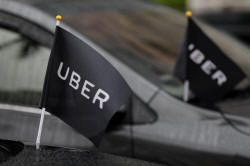|
Alphabet lawsuit against
Uber cements end of uneasy marriage
 Send a link to a friend
Send a link to a friend
 [March 06, 2017]
By Julia Love and Heather Somerville [March 06, 2017]
By Julia Love and Heather Somerville
SAN
FRANCISCO (Reuters) - When Uber Technologies Inc [UBER.UL] was raising
venture capital in 2013, it was one of the hottest deals around – and no
one was more eager to write a check than Bill Maris and David Krane of
Google's venture capital arm.
Not everyone at Google Ventures, since renamed GV, agreed. The firm
already had an investment in a competitor, Sidecar, and Uber was
demanding what then looked like a sky-high valuation.
Maris and Krane prevailed, and the deal is now regarded as GV’s greatest
success. On paper, the firm's initial 2013 investment of $258 million
gained about 14 times its value over the next three years to more than
$3.5 billion.
But now Alphabet Inc, Google's corporate parent, is suing Uber for theft
of trade secrets, alleging that one of the top engineers in its
self-driving car program decamped with thousands of confidential files,
including designs that helped him start self-driving truck company Otto
and then quickly sell it to Uber. Uber denies those claims.
The lawsuit, filed by Alphabet’s self-driving car unit Waymo, has jolted
the fast-growing and highly competitive industry that has sprung up
around autonomous vehicles and ride services, which are seen as the
future of private road transport.
Yet the confrontation was a long time in the making: the complex
relationship between the companies was tense from the start, according
to people familiar with the situation, and soured further as they
increasingly competed with each other.

Now, if the Waymo suit damages Uber, GV's investment in the ride-hailing
company stands to go down as a Silicon Valley rarity: a large funding
deal undermined by the firm's own investors.
“Whatever Waymo gains, Google Ventures loses,” said Stephen Diamond,
associate professor of law at Santa Clara University.
The lawsuit is just one in a series of recent public setbacks for Uber,
including allegations of sexual harassment that prompted an internal
investigation, a video of Chief Executive Travis Kalanick arguing with
an Uber driver that led him to make a public apology, and Uber's
admission on Friday that it used a secret tracking tool to avoid
authorities.
“We have reviewed Waymo's claims and determined them to be a baseless
attempt to slow down a competitor and we look forward to vigorously
defending against them in court," Uber said in a statement in response
to the lawsuit. "In the meantime, we will continue our hard work to
bring self-driving benefits to the world.”
A spokeswoman for GV declined to comment.
DEAL AT ANY COST
Uber was more than just another investment for then-fledgling Google
Ventures, which needed a high-profile deal to put it on the map.
Maris and Krane were early Uber fans, but it took about two years for
the pair to connect with Kalanick. When Uber investor Benchmark finally
brokered a meeting in May 2013, the Google Ventures partners were
determined to do a deal at virtually any cost, according to two sources
close to the transaction.
With other would-be investors waiting in adjacent conference rooms at
Uber’s San Francisco offices, Maris and Krane made their pitch to
invest. Kalanick pushed for a higher valuation, without a board seat;
Google Ventures pushed back, asking for a board observer seat and a
liquidation preference for protection if Uber was sold at a loss, one of
the sources said.
They finally came to terms, with a $3.5 billion valuation, and there
were signs that a broader alliance could be in the offing. Separately,
David Drummond, Google's senior vice president of corporate development,
had a social relationship with Kalanick, and he joined the board.
A ride in a self-driving car and a meeting with Google CEO Larry Page,
recounted in Brad Stone's recent book "The Upstarts," seemed to bode
well for the relationship.


[to top of second column] |

Uber drivers' cars are parked outside the Ministry of Transportation
building during a protest in Taipei, Taiwan February 26, 2017.
REUTERS/Tyrone Siu

But
conflicts emerged immediately. Kalanick, a tough negotiator, wanted a discount
on the software tools behind Google Maps, the company's ubiquitous mapping
software, according to a person close to the transaction. The best Google
Ventures could offer was close contact between Uber and Google’s mapping team,
the person said.
Kalanick also wanted Uber to be featured prominently in Google Maps, eventually
giving customers a way to hail an Uber ride directly from Maps, and Google
agreed, a source close to Uber said. But Uber felt Google dragged its heels on
the integration and found the initial rollout disappointing, the source said.
The friction only grew as Uber turned its attention to autonomous driving, an
area where Google had already established an early lead. Uber announced its
intentions in typically abrupt style in early 2015, poaching 40 faculty and
researchers from Carnegie Mellon University to set up a self-driving lab in
Pennsylvania.
It
bought mapping software firm deCarta and began investing heavily in its own
mapping systems. Meanwhile, Google launched an on-demand delivery service, a
market Uber is also chasing, and began offering a carpooling service through
driving app Waze, which it acquired in 2013. The carpooling feature in
particular rankled Uber, a source close to the company said.
"Things escalated from frenemy to now enemy quite quickly," said Anand Sanwal,
CEO and co-founder of venture capital research firm CB Insights.
The tension bubbled to the surface last August, when Drummond stepped down from
Uber’s board.
Uber declined comment on any of its dealings with Google and did not make
Kalanick available for an interview.
UNDERMINED BY ITS OWN INVESTORS?
Uber’s aggressive culture was the subject of many conversations at Google
Ventures, a source close to the transaction said. Hoping to influence the
startup, the venture firm at first encouraged a flow of talent from Google to
Uber.
Yet that too ultimately created problems. Anthony Levandowski, a key engineering
manager at the self-driving car unit, now called Waymo, began to talk openly
about leaving the company as the autonomous vehicle field blossomed, according
to Alphabet's lawsuit.

In
January 2016, Levandowski and some colleagues quit Alphabet to form the
self-driving truck start-up Otto, which Uber acquired later that year for $680
million. Alphabet claims in its lawsuit that Levandowski had been in touch with
Uber even before he left Alphabet.
In the lawsuit, Alphabet alleges Levandowski downloaded 14,000 proprietary
design documents and used them to create Otto's - and later Uber's - version of
a key autonomous vehicle technology called Lidar, which uses light pulses
reflected off objects to gauge their position.
Uber and Levandowski deny the allegations.
The high-stakes legal showdown over whether vital information was transferred
between the two companies is perhaps the logical conclusion of their opaque
relationship.
All along, Uber remained mysterious to its Google Ventures investors. Kalanick
was adamant from the start that he would share little information, and try as it
might, Google Ventures could not gain better visibility over time, two sources
said. If anything, Kalanick grew more tight-lipped as his business matured.
“It was one of the few companies where we sat there and said, 'Hope it goes
well,'" one of the sources said.
(Reporting by Julia Love and Heather Somerville; Editing by Jonathan Weber and
Bill Rigby)
[© 2017 Thomson Reuters. All rights
reserved.] Copyright 2017 Reuters. All rights reserved. This material may not be published,
broadcast, rewritten or redistributed. |